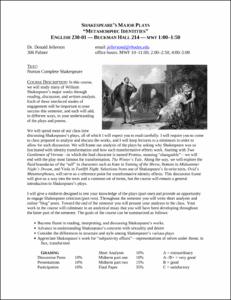Please use this identifier to cite or link to this item:
http://hdl.handle.net/10267/15455Full metadata record
| DC Field | Value | Language |
|---|---|---|
| dc.contributor.author | Jellerson, Donald | - |
| dc.date.accessioned | 2013-02-13T17:18:28Z | - |
| dc.date.available | 2013-02-13T17:18:28Z | - |
| dc.date.issued | 2010-08-25 | - |
| dc.identifier.uri | http://hdl.handle.net/10267/15455 | - |
| dc.description | This syllabus was submitted to the Office of Academic Affairs by the course instructor. Uploaded by Archives RSA Josephine Hill. | en_US |
| dc.description.abstract | In this course, we will study many of William Shakespeare’s major works through reading, discussion, and written analysis. Each of these interlaced modes of engagement will be important to your success this semester, and each will add, in different ways, to your understanding of the plays and poems. We will spend most of our class time discussing Shakespeare’s plays, all of which I will expect you to read carefully. I will require you to come to class prepared to analyze and discuss the works, and I will keep lectures to a minimum in order to allow for such discussion. We will frame our analysis of the plays by asking why Shakespeare was so fascinated with identity transformation and how such transformative effects work. Starting with Two Gentlemen of Verona—in which the lead character is named Proteus, meaning ―changeable‖—we will end with the play most famous for transformation, The Winter’s Tale. Along the way, we will explore the fluid boundaries of the ―self‖ in characters such as Kate in Taming of the Shrew, Bottom in Midsummer Night’s Dream, and Viola in Twelfth Night. Selections from one of Shakespeare’s favorite texts, Ovid’s Metamorphoses, will serve as a reference point for transformative identity effects. This discussion frame will give us a way into the texts and a common set of terms, but the course will remain a general introduction to Shakespeare’s plays. I will give a midterm designed to test your knowledge of the plays (part one) and provide an opportunity to engage Shakespeare criticism (part two). Throughout the semester you will write short analyses and online ―blog‖ posts. Toward the end of the semester you will present your analyses to the class. Your work in the course will culminate in an analytical essay that you will have been developing throughout the latter part of the semester. The goals of the course can be summarized as follows: Become fluent in reading, interpreting, and discussing Shakespeare’s works. Advance in understanding Shakespeare’s concerns with sexuality and desire Consider the differences in structure and style among Shakespeare’s various plays Appreciate Shakespeare’s work for ―subjectivity effects‖—representations of selves under threat, in flux, transformed | en_US |
| dc.language.iso | en_US | en_US |
| dc.publisher | Memphis, Tenn. : Rhodes College | en_US |
| dc.relation.ispartofseries | Syllabi CRN;11662 | - |
| dc.rights | Rhodes College owns the rights to the archival digital images in this collection. Objects are made available for educational use only and may not be used for any non-educational or commercial purpose. Approved educational uses include private research and scholarship, teaching, and student projects. Original copies of the programs are stored in the Rhodes College Archives. In all instances of use, acknowledgement must be given to Rhodes College Archives Digital Repository, Memphis, TN. For information regarding permission to use this image, please email the Archives at archives@rhodes.edu | - |
| dc.subject | English, Department of | en_US |
| dc.subject | Syllabus | en_US |
| dc.subject | Text | en_US |
| dc.subject | Curriculum | en_US |
| dc.subject | 2010 Fall | en_US |
| dc.title | ENGL 230-01/02, Shakespeare's Major Plays: "Metamorphic Identities", Fall 2010 | en_US |
| dc.type | Syllabus | en_US |
| Appears in Collections: | Course Syllabi | |
Files in This Item:
| File | Description | Size | Format | |
|---|---|---|---|---|
| 2010_FALL_ENGL_230_01_11662.pdf | 228.36 kB | Adobe PDF |  View/Open |
Items in DSpace are protected by copyright, with all rights reserved, unless otherwise indicated.